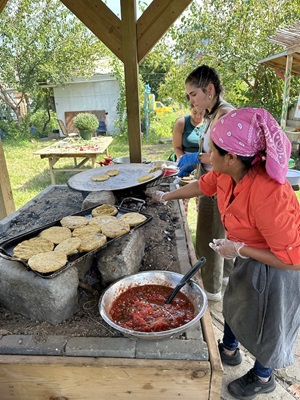
Millions of people across the U.S. lack reliable access to affordable, nutritious food — including about one in six families in Philadelphia. Food and Land Security in Philadelphia, an intensive community-based learning course offered each year in the College of Arts and Sciences, explores the prevalence of this issue right in our own neighborhood.
Community-based learning at Drexel allows students to study the issues affecting the world alongside the people who are affected. Not only does this type of hands-on civic engagement enrich students' college experience by taking them outside the classroom, but it also prompts them to become part of the solution for the urgent problems facing our community.
In addition to the structural inequities that contribute to food insecurity, such as land dispossession and environmental racism, the COVID-19 pandemic has exacerbated it locally and nationally. This is also a problem many college students themselves deal with — research shows that nearly a quarter of undergraduate students nationally face food insecurity. Over one week, students in this course examine the root causes of food and land insecurity in Philadelphia up-close, engaging directly with local community agriculture organizations that are working to fight it.
Steve Vásquez Dolph, PhD, an associate teaching professor of Spanish in the Department of Global Studies and Modern Languages, designed the course and teaches it as part of the UnMapping project, which includes courses throughout the University that engage with local issues across disciplines. Dolph, who also serves as the Associate Dean of Diversity, Equity and Inclusion for the College of Arts and Sciences, facilitates the course, while community farmers lead the daily workshops and conversations.

Students prepare a meal alongside community members. | Photos courtesy of Steve Vásquez Dolph
Throughout the course, which is open to all Drexel and Philadelphia community members, students reflect on the central question, “What does ‘food justice’ mean in your community?” Discussions focus on solutions that can be implemented in a way that serves both the people and the environment. Students interact with Philadelphia neighbors both through online conversations and onsite visits with partner organizations throughout the city, including Sankofa Community Farm at Bartram's Garden, Norris Square Neighborhood Project and César Andreu Iglesias Gardens.
“For many students, this kind of community-based course is their first encounter with education for social change,” Dolph explained. “So many of the things they learn in their classes seem abstract, with little connection to their lived experience. They also often feel exhausted, even alienated, within their coursework. Our land-based classes are designed to help heal the students' relationship not just with each other, with their neighbors, and with the land, but also with the act of learning itself.”
The course’s fast-paced itinerary balances the analysis of critical concepts with hands-on experiences, like learning traditional farming techniques from community leaders. Students reflect on their place in the food system while sharing a daily lunch prepared by these partner organizations, experiencing firsthand the power of a community meal. Along the way, students and neighbors build meaningful, lasting relationships with each other as well as with the land.
As a queer, bilingual Latinx environmental studies major, the course sparked the interest of Ale Gonzales Montoya '23, who applied because they were interested in learning more about the role food and land justice plays in climate change solutions.
Attending college during the pandemic had made it difficult for Gonzales Montoya to find community in Philadelphia. “This class opened the doors for me to connect and revere in a vibrant Latino, immigrant, Indigenous, and Black-centric Philadelphia,” they recalled. “The organizations we visited and the people we met are pillars of their communities, deep in their work and connected to their ancestors and land. It was deeply moving and life-giving; it was a testament to the resilience and vitality of community bonds, even in the face of challenges.”
“What made a lasting impact on me was the relationships I built in that class — the close friends I made and how I connected to the city,” they added. “Additionally, the lens that this class gave me for community work and organizing, and the effects of gentrification.”
Learn more about community-based learning in the College of Arts and Sciences.